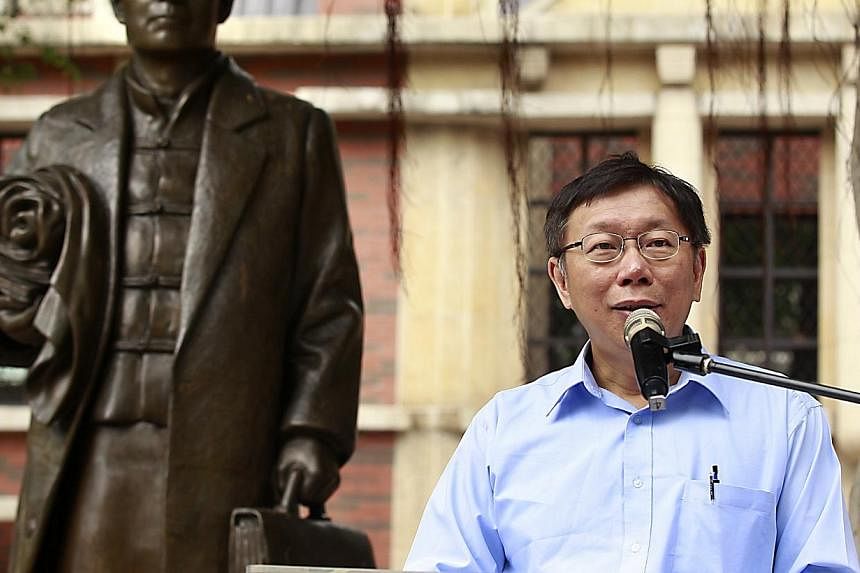Dr Ko Wen-je, a top doctor who is leading the race to be Taiwan's next mayor, speaks to The Straits Times' Li Xueying on the city's ties with Singapore, the prickly issue of cross-strait relations, the Taiwan economy, and whether he wants to be president one day.
Q. How do you see Taipei's ties with Singapore, and what further areas of cooperation would you pursue?
A. I've been to Singapore six or seven times, often for medical conferences. The last was two years ago.
Singapore is a very good model for Taiwan... especially given the similarities in our culture. The area I hope we can learn most from Singapore is in the productivity and efficiency of its public servants. If elected, I hope to take a delegation to Singapore to understand more on how it does that.
Q. You've said there needs to be "more understanding" between both sides of the Taiwan Strait. How will you promote that?
A. I feel that in the past, China saw Taiwan only through the eyes of KMT, and it didn't quite understand Taiwan; it knew only 55 per cent of the people (KMT supporters) but not the remaining 45 per cent. So I'm still planning how to promote better understanding.
But I think (Chinese President) Xi Jinping does understand Taiwan better, given his years in Fujian - look at the san zhong yi qing policy (focusing on the middle-lower income, middle Taiwan, small and medium-sized businesses and youth, as seen during mainland official Zhang Zhijun's visit this year).
Q. During a debate with Mr Sean Lien, you criticised him for not saying the words "Republic of China" at a meeting with Mr Xi Jinping. If you are indeed meeting Mr Xi, what would you say, and would you say those words?
A. Well, there is no need. We should arrange such issues beforehand, on the basis of mutual respect. There is no need to deliberately find trouble with each other.
Q. What is your stance on the question of Taiwan's status?
A. I don't have a specific stance. Whether it should be "independent" or "reunified", these are just labels - what matters is the substance. What that "substance" is, is something still under discussion by the Taiwanese.
But really, what Taiwan cares most about are livelihood issues - that's the most basic problem.
Q. Many young Taiwanese resist closer integration with China - we saw the force of this emotion during the Sunflower movement (student protests against a cross-strait services liberalisation pact in March 2014). Yet the gravitational pull of China is very strong. How do you reconcile this?
A. What the young oppose is the "black box" politics of how the services trade pact was passed; but not trade. They are not against links with the mainland. The agreement should be discussed as quickly as possible and ratified as soon as we can.
That said, while China is an important market, it is not the world to us. We should look at others, like Singapore as well.
Q. The Taipei mayorship has always been a stepping stone for the presidency. Will you be interested in running for the top job one day?
A. We, Chinese, have a saying: Live in the present and not think about the future. Let's resolve today's issue first.
Q. Your rival Sean Lien has said he wants to focus on restoring Taiwan's economic lustre, but we have not heard as much from you on this issue. What is your focus in terms of rejuvenating the economy, especially in creating opportunities for the young?
A. There are three areas Taipei can work on: tax reforms in land and housing, creating more jobs especially in two industries - biotechnology and information technology - and lastly, in state welfare.

